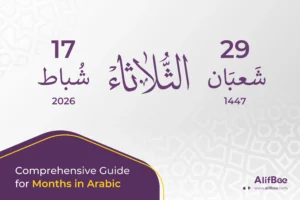Why Learn Stories of Famous Arabic Proverbs
There’s something strangely satisfying about a proverb that says exactly what you didn’t know you needed to hear. Arabic, with its deep storytelling roots, has no shortage of these little gems—short phrases packed with drama, wit, or quiet truth. But many of them make more sense when you know where they came from.
Learning the background stories of famous Arabic proverbs as someone learning Arabic makes it easier to remember the proverb in your daily conversations and to use it accurately.
In this article, we’ll explore the tales behind six of the most famous Arabic proverbs. Some of these Arabic idioms will make you laugh, others might make you think twice, but all of them reveal something deep about human nature and how we relate to one another.
Ready to meet them? Let’s go!
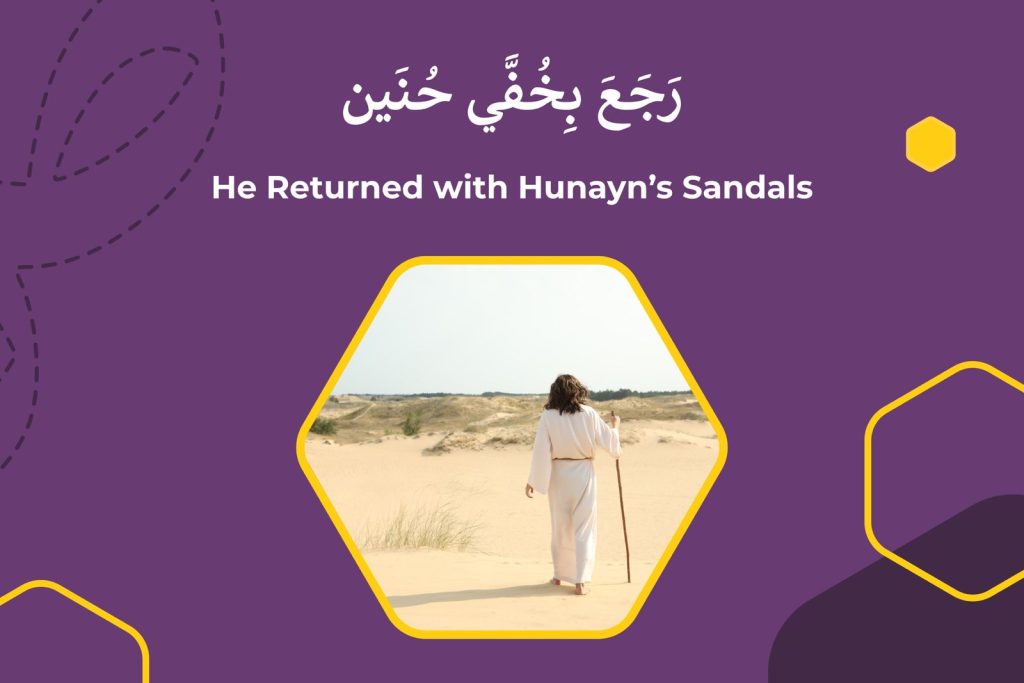
Proverb 1: رَجَعَ بِخُفَّي حُنَين
He Returned with Hunayn’s Sandals
Rajaʻa bikhuffay ḥunayn
The Arabic saying “He returned with Hunayn’s sandals” is used to describe someone who comes back empty-handed from their endeavor, not only failing to achieve their goal, but returning with nothing or even less than what they had. It is often used sarcastically or mockingly to highlight bad luck or a failed attempt.
The origin of this proverb goes back to a man named Hunayn, a skilled cobbler (shoemaker) in the city of al-Hirah, known for his cunning and cleverness.
One day, a Bedouin came to him wanting to buy a pair of sandals. True to Bedouin bargaining style, he haggled aggressively with Hunayn over the price, to the point that he angered him. Then, he walked off without buying anything, mocking Hunayn as he left, clearly intending to insult and belittle him.
Hunayn, furious at the Bedouin’s behavior, decided to teach him a lesson in wit and trickery. So he secretly followed him and hurried ahead to the road the Bedouin would take on his way home. On that road, he placed one sandal on the ground and walked a bit farther to place the second sandal a short distance away.
When the Bedouin came across the first sandal, he said to himself:
“This sandal looks like the ones Hunayn was selling, but what use do I have for a single sandal?”
So he kept walking until he found the second one. Regretting not taking the first, he said:
“If I had picked up the first sandal, I’d now have a complete pair!”
So he tied his camel and went back to retrieve the first sandal.
While he was gone, Hunayn emerged from his hiding place, took the Bedouin’s camel and all its belongings, and made off with them.
When the Bedouin returned, he found neither his camel nor his possessions—just the pair of sandals. He returned to his people empty-handed, barefoot, and humiliated. When they asked him what had happened, he told them the story, and one of them mockingly said:
“He returned with Hunayn’s sandals!”
Since then, the saying has come to describe anyone who ends up disappointed and defeated after aiming for something great.
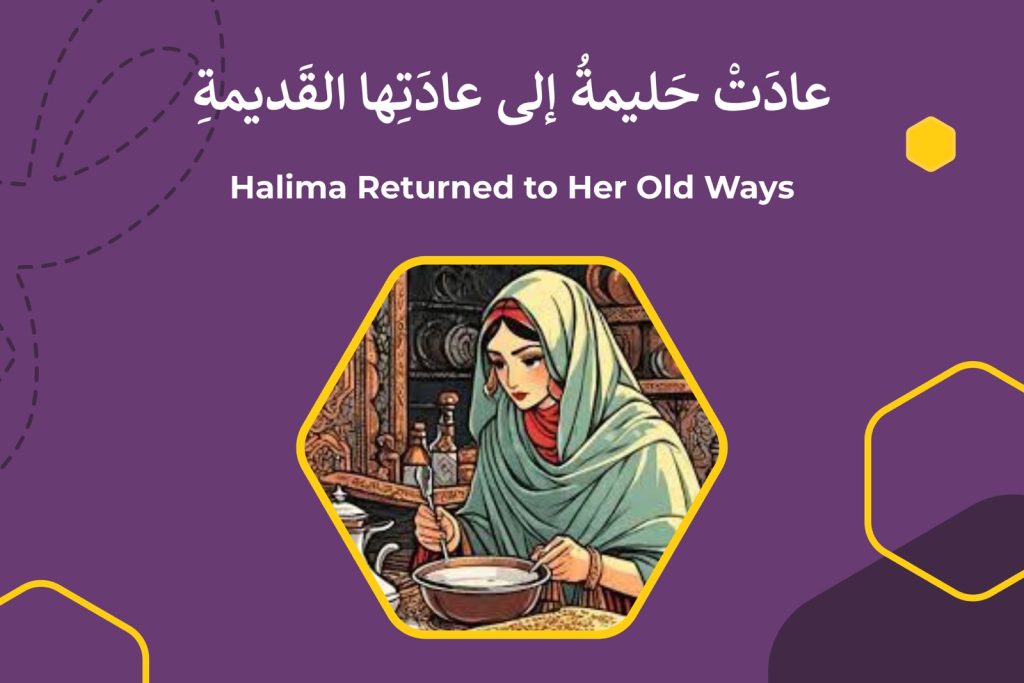
Proverb 2: عادَتْ حَليمةُ إلى عادَتِها القَديمةِ
Halima Returned to Her Old Ways
ʻĀdat ḥalymh ilá ʻādatihā alqadymh
The Arabic proverb “Halima returned to her old ways” is used to describe someone who goes back to a bad habit or undesirable behavior after having given it up. It often conveys disappointment or frustration at that person’s relapse.
The origin of the saying goes back to a woman named Halima, the wife of Hatim al-Tai—one of the most prominent figures of the pre-Islamic era, known far and wide for his generosity. In contrast, Halima was known for her stinginess, especially when it came to using ghee (clarified butter) in cooking.
Halima disliked using too much ghee and was extremely frugal with it, which greatly annoyed her husband. One day, Hatim told her,
“There is blessing in ghee, and using it generously is a sign of generosity and courage.”
Despite his repeated complaints, Halima remained stingy—until Hatim came up with a clever idea to change her habit. Jokingly, he told her:
“They say that a woman who uses plenty of ghee in her cooking will live a long life.”
Tempted by the prospect of a longer life, Halima began to use ghee liberally. Her dishes became delicious and well-regarded for their richness and flavor.
But after some time, tragedy struck—her only son died. Grief consumed her, and she returned to her old frugal ways. When people noticed, they said:
“Halima returned to her old ways.”
Since then, the expression has been used to refer to anyone who reverts to a bad habit after having seemingly changed for the better.
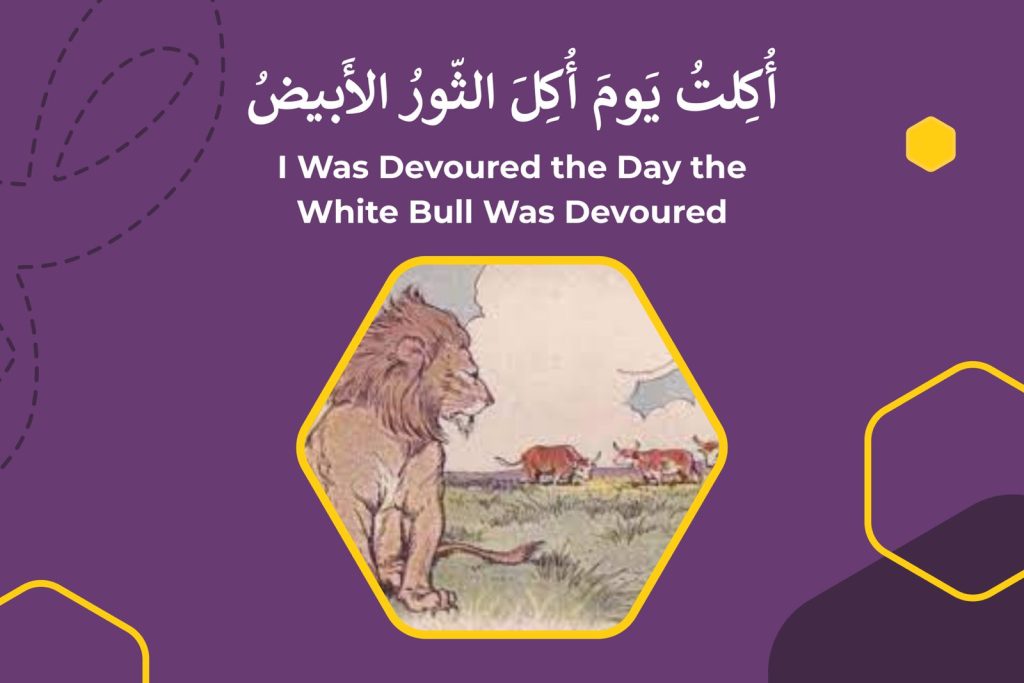
Proverb 3: أُكِلتُ يَومَ أُكِلَ الثّورُ الأَبيضُ
I Was Devoured the Day the White Bull Was Devoured
Ukiltu yawma ukila alththwru alʼabyḍ
The Arabic proverb “I was devoured the day the white bull was devoured” is used as a warning against failing to support others in times of injustice—especially when they are vulnerable. It expresses the realization, often too late, that by abandoning others, one eventually becomes the next victim. The message: when we fail to stand together, we fall one by one.
The story goes back to ancient times and tells of three bulls who lived together in a vast meadow: a white bull, a black bull, a red bull.
These three bulls lived in harmony and safety, united in their companionship and strength. They understood that their unity was their power, and that division would lead to their downfall.
But nearby, a lion was watching them. He longed to eat them but knew he couldn’t take them on together—they were too strong when united.
So the lion devised a cunning plan. He approached the black and red bulls and whispered:
“What do you need the white bull for? His color makes him stand out—he draws attention and might bring enemies upon us. Let me get rid of him first, and I promise to leave you in peace.”
He managed to plant doubt in their hearts. Eventually, they agreed—reluctantly—not to defend the white bull.
The lion attacked and devoured the white bull while the black and red bulls stood by, watching and doing nothing.
Days passed, and the lion grew hungry again. This time he went to the black bull and said:
“The red bull stands out even more—his color is vivid, and his meat tempts me. Let me have him, and I’ll spare you.”
Again, the black bull stayed silent and offered no resistance. The lion killed and ate the red bull.
Before long, the lion turned on the black bull. When he cornered him and the black bull realized his fate, he was filled with regret and uttered the now-famous words:
“I was devoured the day the white bull was devoured.”
Meaning: I sealed my own fate the moment I allowed my companion to be destroyed and did nothing. Our unity was our strength, and my betrayal was the beginning of my end.
This proverb teaches us that injustice, if not resisted from the start, will spread and consume us all. Remaining silent in the face of others’ oppression only paves the way for our own downfall—even if it takes time.
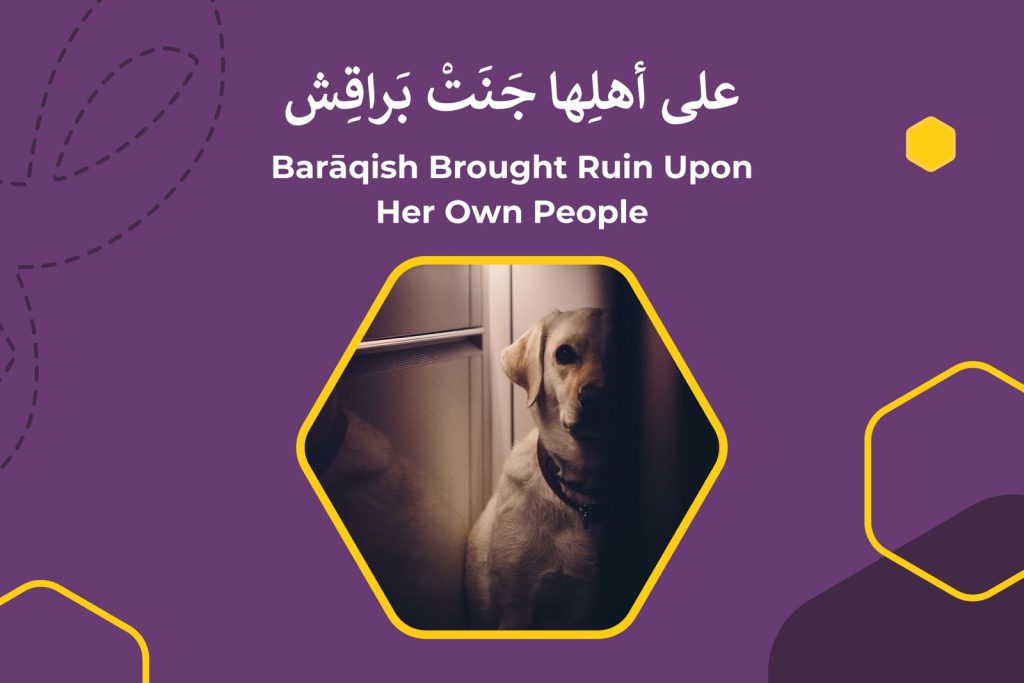
Proverb 4: على أهلِها جَنَتْ بَراقِش
Barāqish Brought Ruin Upon Her Own People
ʻAlá ahlihā janat barāqsh
The Arabic proverb “Barāqish brought ruin upon her own people” is used to describe someone who, out of ignorance or poor judgment, causes harm to themselves or their group—especially when they believed their actions would be helpful. It serves as a warning against rash or ill-considered behavior, reminding us that even well-meaning actions can have disastrous consequences if not thought through.
Barāqish was a dog who lived in a village and was known for her intelligence and loyalty. She guarded the villagers’ homes, barking whenever danger approached or thieves came near, alerting everyone to defend themselves.
One day, enemy raiders attacked the village. The villagers, sensing the danger, fled to a nearby cave in the mountains, taking Barāqish with them. They hid there quietly, hoping to avoid detection.
The enemies passed nearby, uncertain of where the villagers had gone. They were about to leave, unaware of the cave’s presence.
But Barāqish, thinking she was protecting her people, barked at the strangers—revealing their hiding place with her voice.
The attackers immediately rushed to the cave, surrounded it, and killed everyone inside, including Barāqish herself.
From that day on, people began to say:
“Barāqish brought ruin upon her own people,”
meaning that she unintentionally caused the destruction of her people—and herself—through an act meant to protect them.
This proverb is now used to highlight the unintended consequences of reckless or unwise actions, even those taken with good intentions, when they end up causing serious harm to individuals or groups.

Proverb 5: وافَقَ شَنٌّ طَبَقَة
Shann Matched Tabaqa
Wāfaqa shanunun ṭabaqh
The Arabic proverb “Shann matched Tabaqa” is used to describe a perfect harmony or deep compatibility between two people—whether in character, opinions, or behavior—so much so that it seems one was made for the other. It is often used in the context of friendships, marriages, or relationships marked by exceptional mutual understanding.
The origins of this saying go back to the pre-Islamic era and revolve around a man named Shann. He was a sharp-witted, intelligent man who roamed widely in search of someone who matched him in intellect and wisdom—a companion worthy of his friendship.
On one of his journeys, Shann met a man on the road and decided to travel alongside him. Wanting to test the man’s intelligence, Shann asked:
“Will you carry me, or shall I carry you?”
The man was puzzled and replied:
“We’re both riding—how could one of us carry the other?”
Shann realized then that the man lacked the depth of understanding he was looking for.
As they continued on, they passed by a freshly sprouted field. Shann asked:
“Do you think this crop has been eaten or not?”
The man replied:
“We haven’t seen anyone eat it, so how could we possibly know?”
At that, Shann was sure the man didn’t possess the wisdom he sought. But when they arrived at the man’s home, he invited Shann to stay as his guest.
Inside the house, the man’s daughter—an astute and clever young woman named Tabaqa—had overheard their conversation. After Shann left, she said to her father:
“Father, when he said: ‘Will you carry me or shall I carry you?’ he meant: Shall you begin the conversation, or shall I?
And when he asked about the crop being eaten, he meant: Had the owner sold it and used the money (i.e., ‘eaten’ its price), or does he still own it?”
The father was impressed by his daughter’s insight and relayed her interpretations to Shann. Shann was greatly pleased and soon returned to ask for Tabaqa’s hand in marriage—and he married her.
From that time on, people began to say:
“Shann matched Tabaqa,”
to describe two people whose minds and temperaments are perfectly aligned.
This proverb underscores the value of intellectual and personal compatibility, especially in human relationships, and is often cited when two individuals show exceptional harmony in thought or character.
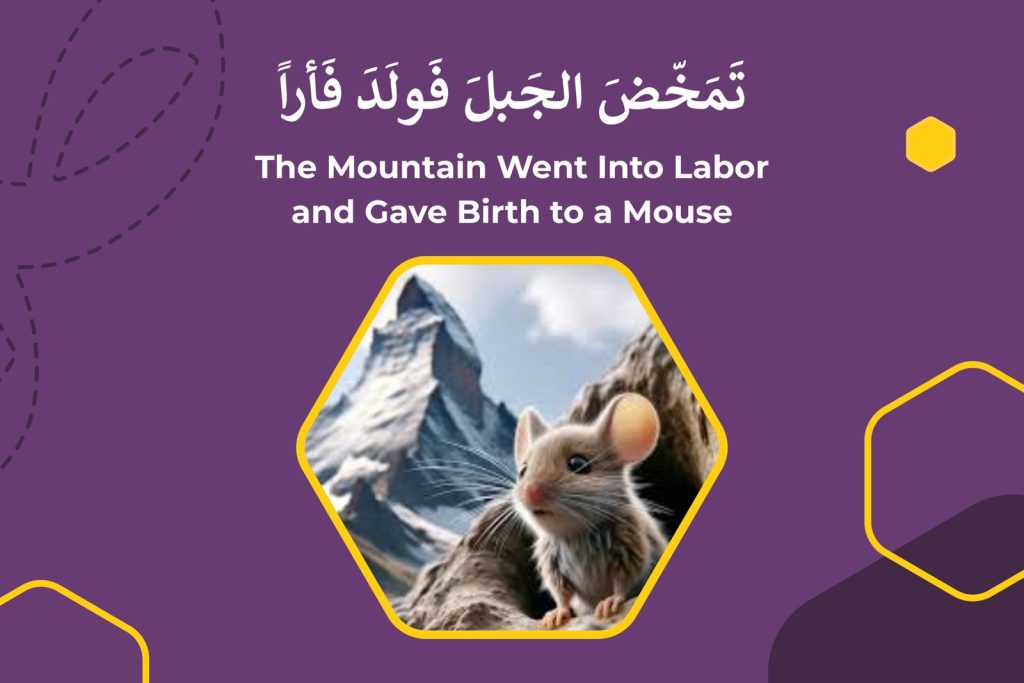
Proverb 6: تَمَخّضَ الجَبلَ فَولَدَ فَأرًا
The Mountain Went Into Labor and Gave Birth to a Mouse
Tamakhkhḍa aljabla fawlada faʼran
The Arabic proverb “The mountain went into labor and gave birth to a mouse” is used to mock someone who stirs up great noise, hype, or dramatic expectations about something supposedly grand, only for the outcome to be trivial and disappointing. It is often aimed at those who exaggerate their promises or boast of great deeds, only to deliver very little in the end.
The story behind this proverb dates back to ancient times, when people began to observe a massive mountain making strange sounds and light tremors. It seemed as if the earth itself was moving within it. Smoke began to rise from the summit, and its sides trembled violently—making people believe that something extraordinary was about to happen.
Terrified and curious, crowds gathered around the mountain, anxiously awaiting the momentous event. Each imagined a different fate: some believed it would erupt with fire, others thought a powerful being or a great treasure would emerge, while some were convinced it was a divine miracle about to unfold.
After much suspense and breathless waiting, everything suddenly stopped. Then, a small crack appeared in one side of the mountain—and out came… a tiny mouse.
The people burst into laughter, ridiculing the absurd contrast between the buildup and the result, and said:
“The mountain went into labor and gave birth to a mouse.”
In other words, all the fuss and anticipation had amounted to nothing of real significance.
Today, this proverb is widely used in contexts like politics, media, and public life—especially when grand announcements or ambitious promises are made, only to result in underwhelming or meaningless outcomes.
Final word
Some of these Arabic sayings might make you laugh. Others hit a little too close to home. But behind each one is a story that stuck around because it captured something real—about trust, pride, failure, or human stubbornness. Arabic proverbs aren’t meant to be motivational posters. They’re sharper than that, often funnier too, reflecting Arab wisdom. And now that you’ve met a few, you’ll probably start spotting them in everyday conversations—or even your own thoughts.
If you liked these stories about famous Arabic proverbs, you can read more of our articles on Arabic proverbs and sayings:
And, to practice Arabic language from the start, download AlifBee App and join millions in learning Arabic with ease with tons of interactive and fun exercises that will keep you hooked until you master the language.







